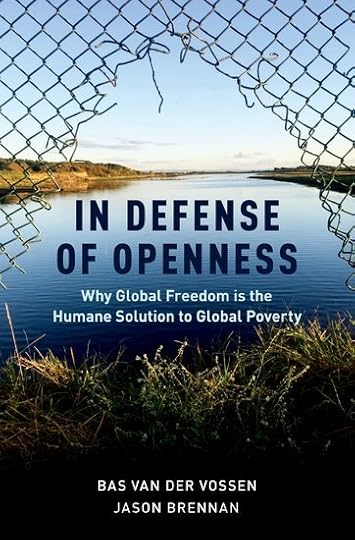Bryan Caplan's Blog, page 61
October 10, 2018
How Open Borders Died in Five Countries
During the last half of the 19th century , many countries competed to attract immigrants. All of them eventually reversed course, but how exactly did this reversal unfold? In “Immigration Policy Prior to the 1930s” (Population and Development Review, 1998), Ashley Timmer and Jeffrey Williams show what happened to immigration policy in the U.S., Canada, Argentina, Brazil, Australia, and the United Kingdom from 1860 to 1930.
Timmer and Williams begin by proposing a policy coding system. Quic...
October 9, 2018
Right-Wing Grievance Studies
The team behind the Sokal 2.0 hoax self-consciously targeted what they call “grievance studies.” What ties all their targets together? My preferred answer is that grievance studies embrace both antipathy and self-pity. Or to be more precise, each of these fields intellectually justifies both:
Antipathy for a large, unselective group. Encouragement of self-pity for the alleged victims of the aforementioned large, unselective group.Feminism, for example, normally combines antipathy for men...
October 4, 2018
Sokal 2.0 as Ideological Turing Test
Normally, I avoid blogging on anything topical; I want to write for the ages, not our daily hysteria. But I’m going to make an exception for… “Sokal 2.0.” The Chronicle of Higher Education provides an overview:
Three scholars — Helen Pluckrose, a self-described “exile from the humanities” who studies medieval religious writings about women; James A. Lindsay, an author and mathematician; and Peter Boghossian, an assistant professor of philosophy at Portland State University — spent 10 months...
October 2, 2018
Two Tactical Reasons to Show Business Some Love
Most economists admit that business serves socially valuable functions. When I express earnest appreciation for business, however, my peers usually respond by mocking Ayn Rand. The sarcasm sings: “Oh, those heroic entrepreneurs!” When people selflessly toil for below-market pay, most economists eagerly endorse approbation. If you don’t earn your marginal product in dollars, applause can nudge the world in the direction of optimality. But why on Earth should we supplement businesses’ pecu...
October 1, 2018
Signaling with the CFA
A reader just sent me this email about signaling with the CFA. Reprinted anonymously with his permission.
Dear Professor Caplan,
I’ve greatly enjoyed reading your EconLog posts and The Case Against Education, and I have a story about signaling from the world of professional certification that might interest you. Specifically, it relates to the Chartered Financial Analyst (CFA) program.
Although I never studied economics or finance in college, I’ve just started working as a quantitative ana...
September 26, 2018
Discounting Identity
I recently remarked: “Appealing to your identity is a reason to discount what you say, not a reason to pay extra attention.” Why do I believe this?
Well, suppose you want to make people agree with you. You’ve got two main routes.
Offer arguments in favor of your view to change what listeners sincerely think. Make continued disagreement feel uncomfortable so listeners pay you lip service.Only #1 is epistemically respectable. But it has a major downside: Good arguments are scarce. #2 is...
September 25, 2018
Singer vs. Horatio Alger

Probably my favorite part of Ban van der Vossen and Jason Brennan’s new In Defense of Openness (Oxford University Press) is their critique of Peter Singer’s “drowning child” argument. Background: Philosopher Peter Singer famously argues that failing to donate your surplus income to help the global poor is morally equivalent to allowing a child to drown in a pond. Van der Vossen and Brennan, in contrast, argue that the global poor are perfectly able to pick themselves up by their own bootst...
September 24, 2018
Our Culture Welcomes You
In hindsight, my recent post on GMU econ blogger culture has one glaring omission. Namely: We are extremely inclusive. Converts are welcome – the more the merrier. But that’s only the beginning. We also cherish our fellow travelers, sympathizers, well-wishers, and tourists. We don’t look for reasons to be angry or reject others. Instead, we search for the intellectual good in everyone. Our views are too unpopular to get upset at people for disagreeing with us, so we build cohesion by n...
September 21, 2018
You Don’t Understand Our Culture
My colleague and dear friend Robin Hanson has once again made the world of social media very angry. His response is to urge people to focus on his actual statements, not speculate about his “true motives.”
Let us instead revert back to the traditional intellectual standard: respond most to what people say, and don’t stretch too hard to infer what you think they mean in scattered hints of what they’ve said and done.
This is fine as far as it goes, but I sense a deeper problem. Critics often...
September 19, 2018
Carens on Nozick on Immigration
In my forthcoming graphic novel, I argue that all leading moral theories strongly support open borders. Only yesterday, though, did I learn that philosopher Joseph Carens covered the utilitarian, Rawlsian, and Nozickian cases in a single 1987 article. The piece: “Aliens and Citizens: The Case for Open Borders” (Review of Politics). EconLog readers may particularly enjoy the Nozickian section:
One popular position on immigration goes something like this: “It’s our country. We can let in or...
Bryan Caplan's Blog
- Bryan Caplan's profile
- 374 followers



